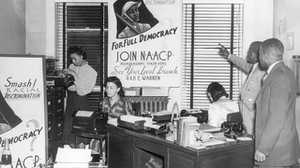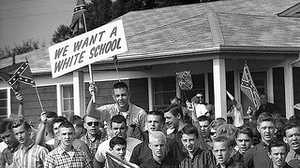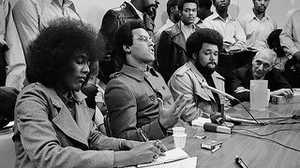The Movement's Tactics

Born in Trinidad in 1941, Stokely Carmichael came to New York at age 11. He became active in the Southern civil rights movement with SNCC, registering voters in the Deep South, and helped form an independent black political group, the Lowndes County Freedom Organization. The black panther was chosen as its symbol.
He was the first civil rights leader to call for "Black power," creating a powerful slogan that would become a rallying cry for African Americans as the Sixties ended. Carmichael changed his name to Kwame Ture to reflect his African heritage. Here he explains some of the tactics used by SNCC organizers.
by Kwame Ture
George Wallace was then head of the Alabama Democratic party. The Alabama Democratic party was racist. Its symbol at that time had a white rooster, a white cock, and the words "White Supremacy." That was the official emblem of the Democratic party of Alabama. So here it would be easy for us to tell our people, "Hey, look, this party is not for us. We need our own party."
This was the first time that as SNCC organizers, Bob Mants and myself were able to go into a county with a full list of names — thanks to the march that was conducted by Martin Luther King — of the strongest people, those who were unafraid, willing to participate. This work can take you sometimes as much as six months when you go into a county, to find and to isolate the people, but this was given to us, and it was demographically broken down because the march had gone through the entire breadth of the county. When we sat down to work, it was a matter of deciding which group we wanted to spend most of our time with out of all the strong people we had collected, in order to spread out rapidly within the county.
Most of the people in Lowndes County grew agricultural goods. But some of them, to combine their income, were also workers. For example, maybe the husband would work and the wife and the children would carry on the agricultural work. This was the case of John Hulett, who was a worker in Montgomery and commuted every day. He worked in the Martin Luther King program. He was even a bodyguard of Martin Luther King's house when they dynamited it in Montgomery in '56. Yet, himself and some others who were workers in Montgomery still could not spring a movement in Lowndes County. But since they had this experience and wanted always to get a movement in Lowndes County, the minute we walked in with a program for a movement, and they could see the program was a clear program that would work, they immediately seized the program. Mr. Hulett was extremely instrumental in helping to rally the population of Lowndes County toward the cause of the struggle.
Luckily it was very easy to form a third party in Alabama. Since the Democratic party was so sure of its authority, it never paid much attention. All you had to do was give yourself a name. You couldn't call yourself a political party until you had received a certain percentage of votes in the election. But the law stipulated that you had to have a symbol. Perhaps one of the reasons the law stipulated this was because of the high rate of illiteracy in Alabama. And so this high rate of illiteracy meant that people could vote by the symbols of the political parties rather than by reading them.
We decided to use the march [the Meredith March Against Fear] for an education purpose. Number one, we wanted to push strongly our struggle against the war in Vietnam. It's one of the areas where we started to hit them with it seriously. And of course we wanted to throw out "Black Power" [as a slogan] for the mass of the people. So we prepared the terrain.
Brother Willie Ricks was sent ahead, as the advance scout, and as we grew bigger sometimes he would have twenty or forty people under his direction. His task was to spread them out to plantations, speak to the sharecroppers. Tell them the march was coming through and to give little Black Power speeches to get the reaction. About three nights before Greenwood, about two o'clock in the morning, Ricks came back and he was giving a report. Cleve Sellers was sitting next to me, and Ricks was saying, "We ought to drop it now. The people are ready for it. I said it the other day and they dropped their hoes." And I said to Cleve, "You know, you sent the wrong man out because we need a clear analysis here and this man is given to exaggerations and talking all sorts of nonsense in hyperbolic terms." Ricks said, "I'm telling you the truth." So as Ricks was telling us about how great the people were, we were moving into Greenwood. Now, I myself had been in Greenwood. I had worked in the [SNCC] project there. I had spent time in the jail in Greenwood so many times the police knew me. The police chief knew me. Everyone in town knew me. So we decided we couldn't go wrong in Greenwood, SNCC's strongest base in the Delta. This is where we will launch Black Power. Unfortunately for the police, we went to set up some tents there and the police had decided to arrest me. So when I got arrested, Ricks was on the side there. He said, "Let them arrest you. We'll get you out of jail, and you come out and make the speech tonight." And he disappears. Anyway, I went to jail but I was bought out, and when I was released it was at night. The speeches were going on, and I was in line. Ricks came back and said, "We have everything prepared. We're ready for Black Power. We've spoke about it all day."
Luckily for us, that night King had to go to do a taped television thing, I think for "Meet the Press," in Memphis. So he was not there. He had other people [from SCLC] there, but they were not a threat to us. It meant the whole night belonged to us and we were in Greenwood, in SNCC territory. So Ricks had everybody primed. He said, "Just get to your speech. We're going against 'Freedom Now,' we're going for 'Black power.' Don't hit too much on 'Freedom Now' but hit the need for the power." So we built up on the need for power and just when I got there, before I got it, Ricks was there, saying, "Hit them now. Hit them now." And I kept saying, "Give me time. Give me time." When we finally got there and we dropped it — Black Power — of course they had been primed and they responded immediately. But I, myself, to be honest, didn't expect that enthusiastic response. And then enthusiastic response not only shocked me but gave me more energy to carry it on further. By the time we got down that night, SCLC was running around everywhere. We knew it was finished. We had made our victory. They could not bring Freedom Now back. It was over. From now on, it was Black Power. We continued with the slogan. King was immediately rushed back. It was too late. We had a meeting the following morning where King tried his best to ask me not to use the term Black Power. But I told him that really I could not do that. That this was an organizational decision, not mine. And like him, I represent an organization and I must represent that organization or I resign from the position which I hold, and I was not prepared to do that, so we would have to use the term.
We expected the press to be completely against us, to use all sorts of terms, but that was not our problem. King was on the march. And since King was on the march, they could not attack the march without attacking King. And King could not leave the march. So their hands would be tied. King obviously could not attack us. If you will look everywhere, King has never attacked Black Power. He said he wouldn't use the term, because of the connotation it conjures up.
From Hampton, Henry, and Steve Fayer, Voices of Freedom: An Oral History of the Civil Rights Movement from the 1950s Through the 1980s (New York: Bantam Books, 1990), pp. 269-270, 276, 289-291.







